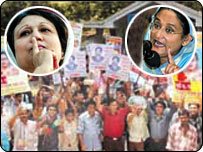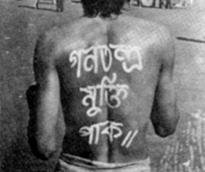Army-backed Reforms Imperil Democracy
By Farid Ahmed
An army-backed plan to marginalise the country's main political parties and their leaders may result in serious damage to the democratic fabric of the country, say observers. After failing to send two long-serving former prime ministers into exile the military-backed interim government has now set in motion plans to divide their parties by encouraging internal dissensions. A group of senior leaders of the Bangladesh Nationalist Party (BNP), led by its secretary general Abdul Mannan Bhuiyan, has already unveiled a reform plan that will exclude party chief Begum Khaleda Zia, who has served two terms as prime minister, from positions of power. The reform plan proposes that the party president be elected by a national executive committee for a period of three years and serve not more than two terms. "If the party chief becomes prime minister, he or she would leave the party post immediately," the proposal says. This would mean Khaleda Zia can no longer become either party chief or prime minister in future, having headed the party for more than 20 years and served two terms as prime minister. A group within the rival Awami League party is working out a similar plan to keep out its chief Sheikh Hasina Wajed, also a former prime minister, from retaining situations of power. Similarly the Jatiya Party, the third largest political outfit in the country, has announced that Rawshan Ershad would now be itsleader, replacing her husband and former president H.M. Ershad. In a statement Ershad said the group led by his wife did not have the legitimacy to remove him."It's clear that the so-called reforms of the political parties are nothing but the plan of excluding the two top women leaders from politics as desired by the interim government," Harun-or Rashid, dean of the social science faculty of Dhaka University, told IPS. Rashid who teaches political science said it was obvious that the emergency regime was restricting political activity to a few hand picked people who are now going about reforming their respective parties. "With this discriminatory attitude, the present government has become a party instead of playing the role of an umpire for the next elections," he said.The interim government has imposed movement restrictions on both Khaleda Zia and Sheikh Hasina -- arch-rivals who have ruled the country for alternative terms since 1991. The parties led by Khaleda Zia and Sheikh Hasina shared nearly 75 percent of the total votes in all elections in the last one-and-a-half decades after democracy was restored in 1991 following the fall of a military dictatorship run by H.M. Ershad. The interim government headed by a former World Bank official took power in January with the help of the army and under a state of emergency, following deadly street violence over the conduct of general elections that were originally timed for Jan. 22. Fakhruddin Ahmed a former central bank governor has vowed to cleanse the country of corruption before holding polls towards end 2008. Since the inception of the state of emergency, the two major parties have seen most of their senior leaders arrested and jailed in the name of cracking down on corruption in the country. Those held include Khaleda Zia's eldest son Tareque Rahman and Awami Leaguegeneral secretary Abdul Jalil.While many were happy with the anti-corruption drive, some have questioned the open moves to create dissensions in the parties, instead of concentrating on getting the elections back on track as promised by Fakhruddin Ahmed. Many believe the move for forging new parties by several groups of people, including Muhammad Yunus, a Nobel prize-winning microcredit pioneer, was supported by the military-backed government.The foreign donors who initially gave unequivocal support for the interim government recently expressed doubt in many activities of the government.The United States has said that it does not want to see any sort of military involvement in Bangladesh politics, and thinks it will be a mistake."We've been pretty straightforward saying that any military personnel can retire or resign from military and decide to take to politics, that's their business, but direct military role in politics will be a mistake," said the outgoing U.S. ambassador in Dhaka Patricia A Butenis."I do not want to see anybody coerced or forced to join a new party, and certainly we do not want to see military involvement inpolitics. I have made this point before that the military should nottake any sort of political role," said Butenis who left Dhaka lastweek for her next assignment in Iraq. Attempts by the interim government to exile the country's two leading ladies failed because of widespread criticism both at home and abroad. Both Sheikh Hasina and Khaleda Zia were slapped with criminal charges, including homicide and corruption, immediately after the attempt at exiling them failed."The process of ongoing reforms in political parties would create suspicion among people... the country needs not only structural changes in political parties, it also needs reforms in overall political culture," BNP chairperson Khaleda Zia told media. President of the Workers Party of Bangladesh Rashed Khan Menon said the ongoing efforts at reforms in different political parties were `'imposed''. ''These efforts are not spontaneous…They have not initiated the process of reforms on the realisation of what they have done in the past," he said. He said the ongoing activities in the name of reform would give rise to mistrust and lead to splits in the parties. "Politics ofconspiracy would hold sway," he warned. Prof. Ataur Rahman of Dhaka University, also president of Bangladesh Political Science Association, said, "It (commonality) is not unusual... in the past things happened in the major political parties the other way round -- powers were concentrated in dynastic leadership...These need to be corrected."But Prof. Rashid was doubtful about the prospect of reforms with its "minus-two solution'' aimed at the two women leaders. "It's not true that only the two top leaders were involved in corruption," he said "It's nothing new. The military dictator in Pakistan Ayub Khan came up with the same theory in 1959, barring a number of national leaders from polls… but he didn't succeed ultimately," he said."Those who are now talking about reforms never told this before,"Rashid said, adding, "now the question arises whether they are doing it in fear of something or under duress."The `New Age' daily in its editorial on Jun. 28 said, "The drastic reforms within the political parties are essential for the democratic growth of society and the state… they would have to be brought about in an open political environment and through the spontaneous movement of the leaders and activists of the parties who demand such reforms.""Forced reforms in a climate of fear, in our view, will fail to deliver democracy within the parties or in society," the editorial said.









No comments:
Post a Comment